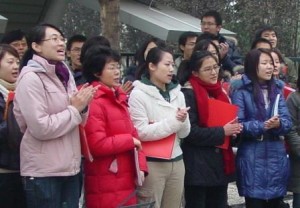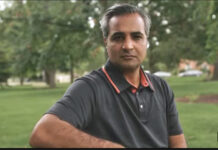By Michael Foust
About 20 members of China’s Shouwang Church were arrested Sunday during the sixth straight weekend that the congregation refused to obey government orders to stop worshipping — a confrontation that has seen nearly 30 church families forced out of their homes and more than 10 members lose their jobs.

China pressured the congregation out of its indoor facilities earlier this year, prompting the church — which is an illegal congregation not registered with the government — to try to gather outdoors on a public square in Beijing. More than 160 church members were arrested the first week, and the church has continued to try to gather each week at the same spot, despite warnings from the government. Throughout the six weeks, hundreds of church members have been placed under house arrest, prevented from even leaving their homes on Sunday mornings.
In China, only churches registered with the government who are members of the Three-Self Patriotic Movement are considered legal. But registration brings heavy restrictions, including prohibitions on evangelism, Sunday School and baptizing children and teens, said Bob Fu, president and founder of ChinaAid, an organization that monitors religious freedom in the country. [Read a Q&A with Fu here.]
ChinaAid itself has become a target. ChinaAid’s website was hacked Friday in what the organization believes was an attack that originated within China. Although some parts of the website were down for several hours, ChinaAid soon restored the full site.
Boxun.com, a Chinese-language website for community journalists, posted a 150-second video Sunday showing two buses parked near the outdoor site, ready to transport Shouwang church members from the site to police stations. Boxun.com pictures also showed marked police cars and at least one unmarked police car. About 20 church members were taken away at 9 a.m. local time. In past weeks, some had been released within several hours while others had been held for 24-48 hours, ChinaAid reported. According to the church’s order of worship, they had planned on reading several passages, including Revelation 4:1-11, in unison and singing several songs before hearing a sermon.
Their commitment to Christ has cost some of them their homes and jobs. Shouwang released a statement several days before the service saying that nearly 30 families had been evicted from their homes and more than 10 people had lost their jobs “because they refused to promise to leave Shouwang Church.” The church says the members were forced out of work or housing by “employees of related government departments.”
“They were given just a few days to move out of their rental homes for no other reason than that they were members of Shouwang Church; in the short-term, they have no fixed abode, and they are getting by by shuttling among the homes of various brothers and sisters in the church,” the statement reads. “Many more believers and church leaders have lost their personal freedom because of being restricted to their homes on Sundays or the other days of the week by local police, neighborhood committee workers or residential security guards.”
Shouwang maintains the incidents “violate China’s current laws.”
In a show of solidarity, more than 15 pastors of other illegal house churches signed a petition to Wu Bangguo, China’s top legislator, declaring that the government’s actions against the church violate the Chinese Constitution and the Universal Declaration of Human Rights, which China signed and which guarantees that “everyone has the right to freedom of thought, conscience and religion,” a right that includes the freedom “in public or private … to manifest his religion or belief in teaching, practice, worship and observance.”
“Yet, for the last 6 decades,” the petition reads, “the rights to liberty of religious faith granted to our country’s Christians by the Constitution of the People’s Republic of China have not been put into practice. According to the current policy for religion management, unless Christians join the strongly politically-charged National Committee of Three-Self Patriotic Movement, their various religious activities (including congregation, worship, ceremony, formation of church, construction of church buildings and evangelism) are still being restricted and suppressed by various governmental management departments.”
The petition asks Bangguo and other members of the Chinese government to investigate China’s rules on churches and determine whether they are in accordance with China’s constitution. It also asks them to investigate the government’s move to prevent Shouwang Church from worshipping indoors.
The incident with Shouwang Church, the petition says, is “not an individual, isolated episode that happens to a single church, but rather a typical phenomenon in respect of the conflict between state and church.”
“With the incessant growth of the number of urban Christians and the continued expansion of the church, the conflict between state and church of this sort is likely to continue to break out,” the petition says. “In view of the representativeness of the Shouwang Church incident, and the significant impact of this incident on the future relationship between state and church in our country, we hereby lodge this Petition. –Michael Foust is associate editor of Baptist Press. To read a Q&A with Bob Fu about Shouwang Church and illegal churches, visit http://www.bpnews.net/bpnews.asp?id=35261



